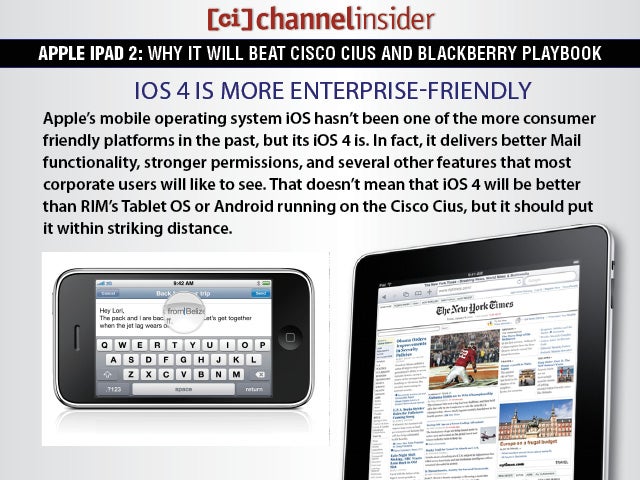 iOS 4 Is More Enterprise-Friendly
iOS 4 Is More Enterprise-Friendly
Apple’s mobile operating system iOS hasn’t been one of the more consumer-friendly platforms in the past, but its iOS 4 is. In fact, it delivers better Mail functionality, stronger permissions, and several other features that most corporate users will like to see. That doesn’t mean that iOS 4 will be better than RIM’s Tablet OS or Android running on the Cisco Cius, but it should put it within striking distance.
 It’ll Have Two Cameras
It’ll Have Two Cameras
The iPad 2 should have two cameras, offering the ability for users to snap photos and engage in video conferencing. For corporate users, video conferencing is extremely important, which is why both the Cisco Cius and the RIM BlackBerry PlayBook will offer that functionality. Considering the iPad 2 likely will, as well, Cisco and RIM won’t have a competitive advantage over Apple.
 Screen Real Estate Matters
Screen Real Estate Matters
The size of a tablet’s display is extremely important to the average enterprise user. Realizing that, the Cisco Cius and RIM’s BlackBerry PlayBook might be at a disadvantage. Those devices come with 7-inch displays. The iPad, on the other hand, has a 9.7-inch display. Not only does the greater screen real estate make it more useful, but enterprise customers should be more productive with it.
 It Won’t Have Android
It Won’t Have Android
As mentioned, Apple’s iOS platform is appealing more to corporate customers than ever before. However, Apple’s Android platform is having more trouble appealing to those folks. The Cisco Cius will be running Android when it ships. But Android hasn’t taken off in the corporate world. It could be a liability — a liability that Apple doesn’t suffer from.
 RIM’s Tablet OS Is A Big Question Mark
RIM’s Tablet OS Is A Big Question Mark
RIM’s upcoming BlackBerry PlayBook tablet will be making its way to store shelves in the coming months. It will feature a new operating system from the company that RIM says, will deliver the same BlackBerry OS experience that corporate customers expect from their smartphones. The only issue is that the enterprise is also suspect of new operating systems, and typically warms up to them slowly. That could hurt adoption of the BlackBerry PlayBook — and help the iPad 2.
 Apple’s Enterprise Focus
Apple’s Enterprise Focus
Apple is warming to the corporate world more than it has in the past. As mentioned, the company’s iOS platform features many more corporate-focused features, including user permissions. Apple might still be a consumer-focused company, but its desire to improve enterprise adoption will help it fight more effectively against the Cius and BlackBerry PlayBook.
 Apps, Apps, Apps
Apps, Apps, Apps
When it’s all said and done, the corporate world is still looking for applications. And at least for now, Apple has a substantial lead when it comes to applications, delivering more programs than any other competitor in the space. The Android Market might catch up, which will help the Cius, and RIM says it will have apps available, as well. But Apple has a big head start.
 The Verizon/AT&T Partnerships
The Verizon/AT&T Partnerships
When Apple decided to bring its iPhone to Verizon’s network, the company opened up the possibilities of making the iPad 2 all the more appealing. It can do that by having access to AT&T and Verizon’s 3G networks built into the iPad. Currently, the iPad has AT&T connectivity built-in and requires the MiFi 2200 HotSpot for access to Verizon’s network. If Apple can offer built-in connectivity for either AT&T and Verizon, it will give customers more options, which only appeals to corporate users.Image 8: Verizon logo9. The Unknown Isn’t Good for Cisco, RIMWho knows what the Cisco Cius or the RIM BlackBerry PlayBook will offer? That’s the question that corporate users are asking right now. And in most cases, when corporate users ask that, they don’t tend to adopt the technologies that they’re suspect about. The enterprise isn’t so suspect about the iPad 2. And that should play into Apple’s favor.
 The Unknown Isn’t Good for Cisco, RIM
The Unknown Isn’t Good for Cisco, RIM
Who knows what the Cisco Cius or the RIM BlackBerry PlayBook will offer? That’s the question that corporate users are asking right now. And in most cases, when corporate users ask that, they don’t tend to adopt the technologies that they’re suspect about. The enterprise isn’t so suspect about the iPad 2. And that should play into Apple’s favor.ajor thorn in the sides of both Cisco and RIM.
 The Consumerization of IT
The Consumerization of IT
The corporate world is becoming more influenced by consumers than ever before. Some companies are allowing employees to bring their consumer-focused products into the enterprise, while other firms are realizing that some of those devices might have a place in their operation. Such consumerization plays into Apple’s (and the iPad’s) favor. And it could prove to be a major thorn in the sides of both Cisco and RIM.

